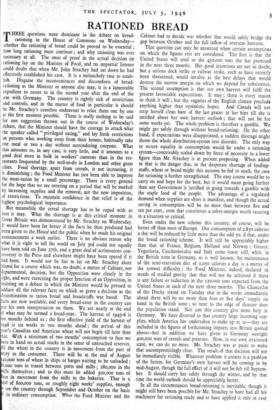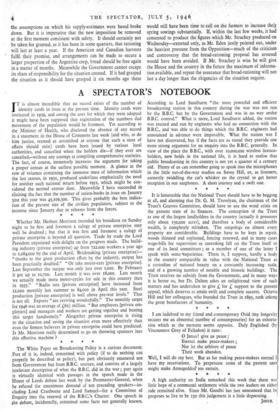RATIONED BREAD
THREE questions were dominant in the debate on bread- rationing in the House of Commons on Wednesday— whether the rationing of bread could be proved to be essential ; how long rationing must continue ; and why rationing was ever necessary at all. The onus of proof in the actual decision on rationing lay on the Minister of Food, and no impartial listener could doubt that when Mr. John Strachey had sat down he had effectively established his case. It is a melancholy case to estab- lish. Disguise the inconveniences and discomforts of bread- rationing as the Minister or anyone else may, it is a lamentable expedient to resort to in the second year after the end of the war with Germany. The country is rightly sick of restrictions and controls, and in the matter of food in particular it should be Mr. Strachey's ceaseless endeavour to relax them one by one at the first moment possible. There is really nothing to be said for one suggestion thrown out in the course of Wednesday's debate, that the Minister should have the courage to attack what the speaker called " privileged eating," and lay fresh restrictions on persons who, working away from their homes, habitually take one meal or two a day without surrendering coupons. What this amounts to, in any case, is very little, and it amounts to a good deal more in bulk in workers' canteens than in the res- taurants frequented by the well-to-do in London and other great cities. Food shortage, apart from cereals, is not increasing, it is diminishing ; the Food Minister has just been able to improve the meat-ration by a small percentage. There is every ground for the hope that we are entering on a period that will be marked by increasing supplies and the removal, not the new imposition, of restrictions. To maintain confidence in that relief is of the highest psychological importance.
But meanwhile the cereal shortage has to be coped with as best it may. What the shortage is at this critical moment in Great Britain was -demonstrated by Mr. Strachey on Wednesday. It would have been far better if the facts he then produced had been given to the House and the public when he made his original announcement a week earlier. There is no obvious reason why what it is right to tell the world on July 3rd could not equally have been told on June 27th, and a great deal of acrimonious con- troversy in the Press and elsewhere might have been spared if it had been. It would not be fair to lay on Mr. Strachey alone blame for a course which was, no doubt, a matter of Cabinet, not departmental, decision, but the Opposition were clearly in the right, and were exercising the proper function of an Opposition, in insisting on a debate in which the Minister would be pressed to adduce all the relevant facts on which so grave a decision as the determination to ration bread and breadstuffs was based. The facts are now available, and every bread-eater in the country can put his own interpretation on them. We are nearly at the end of what may be termed a bread-year.. The-harvest of 1945-6 is ten months behind us ; the first effective yield of the harvest of 1946 is six weeks to two months ahead ; the arrival of this year's Canadian and American wheat will not begin till later than hat. With a minimum of two months' consumption to face we ave in hand no actual stocks in the sense of untouched reserves.
11 the wheat in the country is in movement from the port of ntry to the consumer. There will be at the end of August 4o,000 tons of wheat in ships or barges yvaiting to be unloaded ; o,000 tons in transit between ports and mills ; 280,000 in the ills themselves ; and to this must be added 300,000 tons of our in movement from the mills to the bakeries. That is a otal of 800,000 tons, or roughly eight weeks' supplies, enough o see the country through September and October on the basis f its ordinary consumption. What the Food Minister and the Cabinet had to decide was whether that would safely bridge the gap between October and the full inflow of overseas harvests.
That question can only be answered when certain assumptions on which the figures rest are considered. The first is that the United States will send us the 450,00o. tons she has promised in the next three months. Her good intentions are not in doubt, but a serious dock strike or railway strike, such as have recently been threatened, would involve at the best delays that would destroy the narrow margin on which we depend for subsistence. The second assumption is that our own harvest will fulfil the present favourable expectations. It may ; there is every reason to think it will ; but the vagaries of the English climate preclude anything higher than optimistic hopes. And Canada will not strip herself clean bare of the last grains in her bins till she is satisfied about her own harvest outlook ; that will not be for some weeks yet. The whole problem is therefore a gamble. We might get safely through without bread-rationing. On the other hand, if expectations were disappointed, a sudden shortage might throw the whole distribution-system into disorder. The only way to secure equality in consumption would be under a rationing system—conceivably scaled down by force of necessity to a lower figure than Mr. Strachey is at present proposing. When added to that is the danger that, in the desperate shortage of feeding- stuffs, wheat or bread might this autumn be fed to stock, the case for rationing is further strengthened. The easy course would be to carry on and hope for the best, but it would mean going further than any Government is justified in going towards a gamble with the staple food of the people. The advantage of a regulated demand when supplies are short is manifest, and though the actual saving in consumption will be no more than between five and ten per cent., even that constitutes a safety-margin worth securing in a situation so critical.
Even under the new scheme this country, of course, will be better off than most of Europe. Our consumption of 2,85o calories a day will be reduced by little more than the odd 5o, if that, under the bread rationing scheme. It will still be appreciably higher than that of France, Belgium, Holland and Norway ; Greece, Yugoslavia, Czechoslovakia and Italy come lower still, while in the British zone in Germany, as is well known, the maintenance of the semi-starvation diet of 1,050 calories a day is a matter of the utmost difficulty ; the Food Minister, indeed, declared in words of studied gravity that that will not be achieved if there is any failure or reduction in the 120,000 tons expected from the United States in each of the next three months. The Chancellor of the Duchy stated on Tuesday that in the weeks immediately ahead there will be no more than four or five days' supply on hand in the British zone ; so near to the edge of disaster does the population stand. Nor can this country give more help in Germany. We have diverted to that country large incoming sup- plies, which America has undertaken to make up to us—they are included in the figures of forthcoming imports into Britain quoted above—but in addition we have given to Germany outright 400,000 tons of cereals and potatoes. Now, in our own straitened state, we can do no more. Mr. Strachey was at pains to make that uncompromisingly clear. The result of that decision will not be immediately visible. Whatever problem it creates is a problem of the future, for Germany's own harvest will be coming in by mid-August, though the full effect of it will not be felt till Septem- ber. It should carry her safely through the winter, and by that time the world outlook should be appreciably better.
In all the circumstances bread-rationing is inevitable, though it might still have been possible for Mr. Strachey to have had all his machinery for rationing ready and to have applied it only in case the assumptions on which his supply-estimates were based broke down. But it is imperative that the new imposition be removed at the first moment consistent with safety, It should certainly not be taken for granted, as it has been in some quarters, that rationing will last at least a year. If the American and Canadian harvests • fulfil their promise, and arrangements can be made to secure a larger proportion of the Argentine crop, bread should be free again in a matter of months. Meanwhile the Government cannot escape its share of responsibility for the situation created. If it had grasped the situation as it should have grasped it six months ago there would still haVe been time to call on the farmers to increase their spring sowings substantially. If, within the last few weeks, it had consented to produce the figures which Mr. Strachey produced on Wednesdayextorted only, as Mr. Eden justly pointed out, under the heaviest pressure from the Opposition—much of the criticism and controversy that the bread-rationing proposal has aroused would have been avoided. If Mr. Strachey is wise he will give the House and the country in the future the maximum of informae- tion available, and repeat the assurance that bread-rationing will not last a day longer than the exigencies of the situation require.



























 Previous page
Previous page